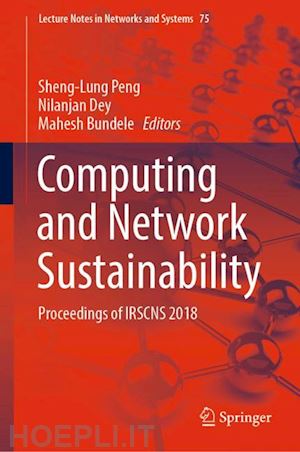
Questo prodotto usufruisce delle SPEDIZIONI GRATIS
selezionando l'opzione Corriere Veloce in fase di ordine.
Pagabile anche con Carta della cultura giovani e del merito, 18App Bonus Cultura e Carta del Docente
This book offers a compilation of technical papers presented at the International Research Symposium on Computing and Network Sustainability (IRSCNS 2018) held in Goa, India on 30–31st August 2018. It covers areas such as sustainable computing and security, sustainable systems and technologies, sustainable methodologies and applications, sustainable networks applications and solutions, user-centered services and systems and mobile data management. Presenting novel and recent technologies, it is a valuable resource for researchers and industry professionals alike.
Dr. Sheng-Lung Peng, obtained his M.Sc. (Computer Science) from National Chung Cheng University, Taiwan, and Ph.D. (Computer Science) from National Tsing Hua University, Taiwan. He is currently a Professor in the Department of Computer Science and Information Engineering, National Dong Hwa University, Taiwan. He is also Director of Library and Information Center in the same University. His research interests are in Designing and analysing algorithms for combinatorics, bioinformatics, data mining and networks. He has about one hundred papers in Journal and Conference proceedings.
Nilanjan Dey, was born in Kolkata, India, in 1984. He received his B.Tech. degree in Information Technology from West Bengal University of Technology in 2005, M.Tech. in Information Technology in 2011 from the same University and Ph.D. in digital image processing in 2015 from Jadavpur University, India.In 2011, he was appointed as an Asst. Professor in the Department of Information Technology at JIS College of Engineering, Kalyani, India followed by Bengal College of Engineering College, Durgapur, India in 2014. He is a visiting fellow of University of Reading, UK. He is now employed as an Asst. Professor in Department of Information Technology, Techno India College of Technology, India. His research topic is signal processing, machine learning, and information security.Dr. Dey is an Associate Editor of IEEE Access and is currently the Editor-in-Chief of the International Journal of Ambient Computing and Intelligence, and Series co-editor of Springer Tracts of Nature-Inspired Computing (STNIC).
Dr. Mahesh Bundele is currently working as Professor in Computer Engineering and Dean (Research & Development) at Poornima University, Jaipur, India. He is heading Advanced Studies Research Center and responsible for design, development and execution of research curriculum and processes for Masters in Engineering and Doctoral Program in School of Engineering, Sciences and Management. He has total 31 years experience in teaching and research. He has developed many unique research methodology concepts and implemented. He is the mentor and controller of quality research and publications at the University. He is also responsible for inculcation of innovative and critical analysis concepts across the University and across the Poornima Foundation involving three other campuses. He is working on various research projects sponsored by various agencies. He did his doctoral degree in Wearable Computing and guiding research in Pervasive & Ubiquitous Computing, Computer Networks, Software Defined Networking. His areas of interests are also Wireless Sensor Networks, Algorithmic research, Mathematical Modeling, and Smart Grids. He has worked on many government and non- government research projects and guided bachelors and master degree students for their research. He has more than 30 publications in reputed journals and conferences. He has been reviewer of few IEEE Transactions. He is actively involved in IEEE activities in Rajasthan Subsection and Delhi Section and holding the responsibility on Standing Committee of IEEE Delhi Section for Technical & Professional activities for controlling quality of conferences and publications in IEEE. He is also holding the position of membership development chair at IEEE Rajasthan Subsection.











Il sito utilizza cookie ed altri strumenti di tracciamento che raccolgono informazioni dal dispositivo dell’utente. Oltre ai cookie tecnici ed analitici aggregati, strettamente necessari per il funzionamento di questo sito web, previo consenso dell’utente possono essere installati cookie di profilazione e marketing e cookie dei social media. Cliccando su “Accetto tutti i cookie” saranno attivate tutte le categorie di cookie. Per accettare solo deterninate categorie di cookie, cliccare invece su “Impostazioni cookie”. Chiudendo il banner o continuando a navigare saranno installati solo cookie tecnici. Per maggiori dettagli, consultare la Cookie Policy.